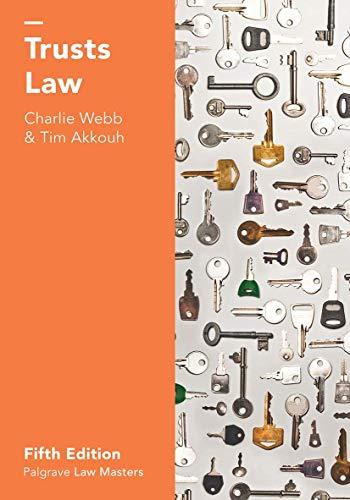Question
Part 1: Prepare a fact pattern that you believe would give rise to a nuisance cause of action. Your fact pattern should be at least
Part 1:
Prepare a fact pattern that you believe would give rise to a nuisance cause of action. Your fact pattern should be at least one paragraph.
Once you have completed your fact pattern, state the qualification of the nuisance represented by a fact pattern: private, public, or mixed. Additionally, explain why you have qualified your fact pattern in this manner, including identifying the specific elements associated with this type of claim.
In summary, your response should include the following:
- your fact pattern;
- your classification of the type of nuisance action (private, public, or mixed) represented by your fact pattern; and
- your reasoning for why you believe your fact pattern would be actionable as this type of nuisance claim.
Be sure to also respond in a substantive manner
Part 2:
Hypothetical:
Jack and Jill Jones were driving along Interstate 928 on the beltway around the city in State Y. Jack was driving, and Jill was the passenger. Jack had been driving for a continuous 18 hours.
Meanwhile, Terri Boss was also driving along Interstate 928 on the beltway around the city in State Y. She was intoxicated. Her blood alcohol level was .21. A State Y criminal statute provides that .10 is legally drunk.
Boss's automobile collided with the Jones's vehicle, killing Jack. It is unclear what caused the accident. Jill suffered permanent disability in her left leg. Jack is survived by his wife Jill and three minor children. Boss suffered a broken leg. State Y has a survival statute as well as a wrongful death statute.
Twenty-five months after the accident, our law firm has been contacted by Jill Jones to represent her and determine what type of claim she and/or her children may still have against Terri Boss. Draft an informal (internal) memorandum of law to your supervising attorney evaluating the following:
- any possible tort cause(s) of action by either Jill Jones or Terri Boss and
- any possible defense(s) associated with the identified cause(s) of action.
Keep in mind that the purpose of a memorandum of law is to convey information about a legal issue and/or to provide an analysis of a legal problem in a concise, articulate, and written manner. Here is one example of a format that you may use to prepare your memorandum. Keep in mind that there are various ways to complete a legal memorandum and this is just one example:
Memorandum Outline:
- Heading:This section contains the name of the person who assigned you to write the memorandum, your name, the date that the memo was completed, and the subject of the memorandum, such as the client's name (if applicable) and/or the legal issue(s).
- Statement of Facts:This section briefly describes the pertinent facts related to why you are writing the memorandum. This section should not include every detail regarding what occurred but, rather, should only be a brief summary of the legally relevant facts of your case. Legally relevant facts are facts that answer the legal questions that are the focus of the memorandum.
- Legal Issue(s)/Question(s) Presented:This section is sometimes referred to as "Question(s) Presented." This section concisely states the legal questions that the memorandum will answer. In other words, it explains the legal questions that you researched and are now going to answer for the attorney.
- Applicable Statute(s) (if there is statutory law):This section only includes statutory law, and it is best to quote directly to the relevant language of the statute. Also, do not forget to provide pinpoint citations here and use proper Bluebook citation.
- Analysis/ Discussion:This section is the most comprehensive and lengthy part of the memorandum. This is where you demonstrate the results of your research. The analysis (or discussion) section should discuss each issue and explain any laws that may apply. Remember to always be objective and sufficiently examine any laws that are relevant to the particular issue, whether they support the client's case or not.
- Conclusion:This section is a summation of the above and should very briefly re-state the conclusion that you reached for each legal issue of the client's case and highlights the main points of your analysis that led you to reach the result that you did. It directly answers or responds to the legal issue(s) presented earlier in the memorandum. It does not provide an analysis.
Please answer in part 1 and part 2, please give citations and detailed. thank u
Step by Step Solution
There are 3 Steps involved in it
Step: 1

Get Instant Access to Expert-Tailored Solutions
See step-by-step solutions with expert insights and AI powered tools for academic success
Step: 2

Step: 3

Ace Your Homework with AI
Get the answers you need in no time with our AI-driven, step-by-step assistance
Get Started


